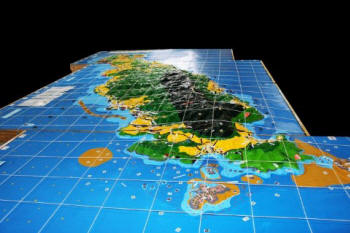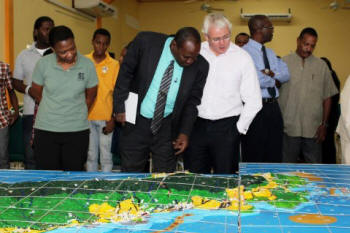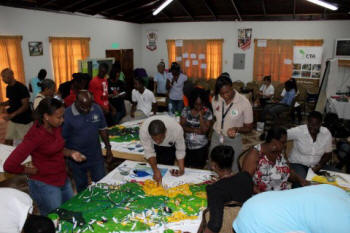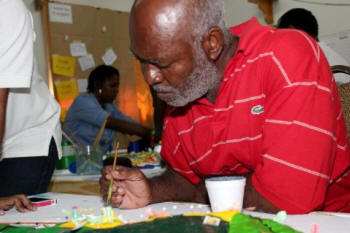Participatory 3D Modelling for Climate Change Adaptation and Disaster Risk Reduction in Tobago

 This 1:10,000-scale model (1.5x vertical exaggeration) covering an area of 1,152 sq. km. including marine and terrestrial components of Tobago Island in Trinidad and Tobago was completed in October 2012.
This 1:10,000-scale model (1.5x vertical exaggeration) covering an area of 1,152 sq. km. including marine and terrestrial components of Tobago Island in Trinidad and Tobago was completed in October 2012.
Note: The model was produced in the context of the CTA-funded project “Promoting participatory ICTs for adding value to traditional knowledge in climate change adaptation, advocacy and policy processes in the Caribbean and the Pacific”.
The model was built by a total of 107 residents of Tobago including students and volunteers from the island, elders and invited guests.

 The map-making exercise was facilitated by Kenn Mondiai, from Partners With Melanesians (PwM), and Kail Zindapan from PAFID, Philippines. The event was organized by Caribbean Natural Resources Institute (CANARI) and benefitted from additional support provided by UNDP GEF – SGP. CTA supported the participation of delegates from a range of organisations with the objective of building capacity in the adoption and deployment of the P3DM process in the Caribbean.
The map-making exercise was facilitated by Kenn Mondiai, from Partners With Melanesians (PwM), and Kail Zindapan from PAFID, Philippines. The event was organized by Caribbean Natural Resources Institute (CANARI) and benefitted from additional support provided by UNDP GEF – SGP. CTA supported the participation of delegates from a range of organisations with the objective of building capacity in the adoption and deployment of the P3DM process in the Caribbean.
In November 2013, after completion of the model Tobago’s stakeholders produced a civil society agenda addressing climate change issues in the island. The activity has been facilitated by CANARI and supported by funding from the Federal Republic of Germany
The event has been the first of this kind in the region and contributed to the introduction of participatory three-dimensional modelling (P3DM) in the Caribbean. P3DM is a tool that can be used across small island countries to facilitate effective participation by local communities and other stakeholders in the identification of specific policies and actions needed to address the impacts of climate change and extreme climatic events. The P3DM process favours the recognition of the value of traditional knowledge, increases capacity, facilitates coordination and collaboration across sectors, and builds buy-in for implementation of plans for resilience to climate change.
The initiative has been implemented by the Caribbean Natural Resources Institute (CANARI), the University of the West Indies (UWI), the Tobago House of Assembly (THA), Division of Agriculture, Marine Affairs, Marketing and the Environment (DAME) and the Partners with Melanesians (PwM). The project has been funded by the Technical Centre for Agricultural and Rural Cooperation ACP-EU (CTA) and the United Nations Development Programme and the Global Environment Facility (GEF) Small Grants Programme (SGP).
Recommended readings:
CANARI. 2013. Policy Brief 15: Using traditional knowledge for decision-making on climate change in the Caribbean. 4pp
CANARI. 2013. Précis de politique 15: L’utilisation des savoirs traditionnels dans le cadre des processus de prise de décision relatifs au changement climatique dans la Caraïbe. 4 pp
CANARI. 2013. Uso de los conocimientos tradicionales en los procesos de toma de decisión sobre el cambio climático en el Caribe. 4 pp
Bobb-Prescott, N. 2014. Case study on the use of participatory three dimensional modelling to facilitate effective contribution of civil society in the Caribbean islands in planning for action on climate change. CANARI Technical Report 401, Laventille.
Giacomo Rambaldi. 2011. Participatory 3-Dimensional Modelling: Guiding Principles and Applications; 2010 edition; CTA, The Netherlands
Related blogposts:
Knowledge holders add value to the 3D model of Tobago
Participatory 3D model of Tobago seen as time capsule
Blank 3D model of Tobago accommodates first set of community inputs
Tobago P3DM – The missing islet
P3DM blank model of Tobago ready for accommodating community’s knowledge
Participatory 3D Modelling in Tobago – key venues
Participatory 3D Modelling exercise kicks off with much gusto in Tobago
ICTs for Climate Change Adaptation: Introduction of innovative technologies in the Caribbean
Participatory 3D Modelling (P3DM): five years after receiving the World Summit Award
Related video documentation
She becomes more beautiful: Capturing the essence of Tobago Island for a better tomorrow
Participatory data generation: stunning results from the P3DM exercise in Tobago reports Adam Jehu
Goldberg Job reports back on his participation in a participatory 3-dimensional modelling exercise in Tobago
“My feelings in being part of a P3DM process.” Feedback from Anthony, the livewhire
Tobagonians build model of Tobago to plan for the impacts of extreme climatic events

Follow us!